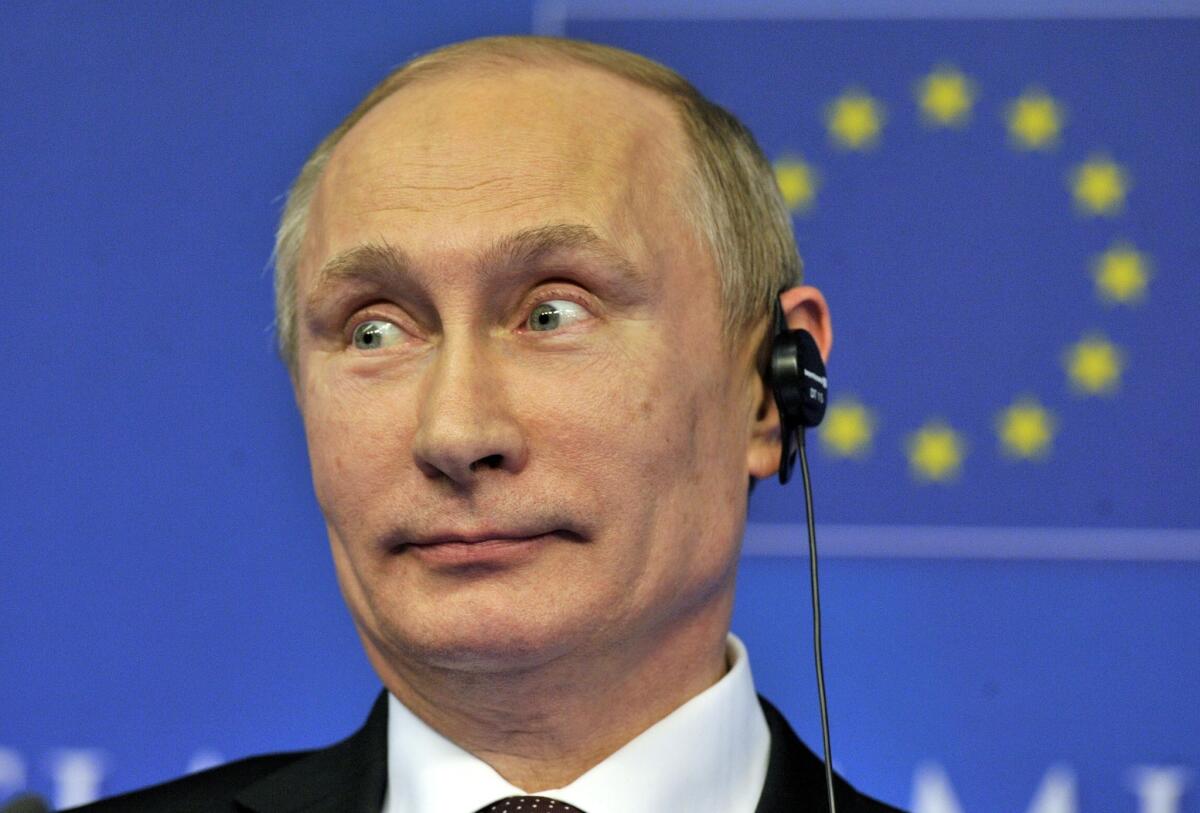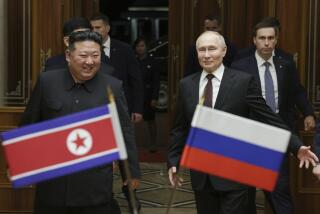No more Mr. Nice Putin

Vladimir Putin has been on his best behavior as the Sochi Olympic Games approach. He has granted amnesty to prisoners and political opponents, downplayed Russiaâs anti-gay law, lifted a blanket prohibition on demonstrations at Sochi and acted the welcoming host. The Olympics are a showcase for Russia and for him personally. He wants nothing to spoil the Games.
The Sochi Olympics will come and go, and the less kind, less gentle Putin will be back. He is likely to turn attention to Russiaâs neighbors that drew closer to the European Union last year â to punish them and to try to drag them back into Moscowâs fold. Moldova and Georgia are prime targets, having initialed agreements with the EU in November. If a settlement of Ukraineâs current crisis eventually puts it back on track to sign its association agreement with the EU, that country also will find itself in Putinâs cross hairs. Washington and the European Union must consult and agree on a joint strategy in anticipation of such a development.
Putin does not want to re-create the Soviet Union. He wants deference from neighboring states. He knows that EU association agreements would pull states from Moscowâs economic and geopolitical orbit. Keeping them in requires leverage. In past disputes with neighbors, Russia has used natural gas price increases and cutoffs, embargoed key imports and stoked inter-ethnic tension as a means of pressure or simply as payback.
Each of the potential target countries has significant vulnerabilities.
Moldova remains dependent on Russia for natural gas. Many Moldovans work in Russia, remitting their pay back home. Moscow could move to recognize Transnistria, Moldovaâs breakaway eastern region, or exploit the upcoming Moldovan parliamentary elections to support candidates opposed to deepening links with Europe.
Georgia has already borne the brunt of Russian displeasure, including trade embargoes, visa suspensions and military conflict in 2008. Moscow recognized Georgiaâs breakaway regions of Abkhazia and South Ossetia and constructed border installations. With Russian forces in both, Moscow could provoke border incidents to weaken the government in Tbilisi, the Georgian capital.
Ukraine presents a special case. Late last year, President Viktor Yanukovich put his European ambitions on ice in return for a $15-billion economic bailout and a lower gas price from Russia.
Putin is no fool. Yanukovich has been rented, not bought. Moscow is doling out its credits in pieces and reviewing the gas price on a quarterly basis. Putin understands that significant forces within Ukraine want to sign the already initialed EU association agreement. If a genuine dialogue gets underway in Kiev to end the crisis, a negotiated settlement could put the country back on its European course.
If that happens, Moscow would play hardball. With Yanukovichâs government looking shaky after months of protests and the Jan. 28 resignation of the prime minister and Cabinet, Moscow put its bailout on hold last week, with Putin saying the Russians would wait to see who would make up the new Cabinet. The Russians could boycott Ukrainian imports and turn off the flow of gas (as they did in 2006 and 2009) if Ukraine again moves to sign the association agreement. More ominously, the Kremlin could seek to weaken the Ukrainian stateâs coherence, for example, by stirring tension in Crimea, which has a large concentration of ethnic Russians and hosts a sizable part of the Russian Black Sea fleet.
Many of these actions would violate Russiaâs commitments as a member of the Organization for Security and Cooperation in Europe and the World Trade Organization. Any of these actions pose a challenge to the foreign policies of the EU and the Obama administration. Both have taken the position that Moldova, Georgia and Ukraine have the freedom to choose their own foreign policy course as sovereign states.
The U.S. government must coordinate with the EU on several measures to prepare for a ârogueâ Russian course in the neighborhood:
⢠Send joint messages to Moscow stressing Western support for the right of Russiaâs neighbors to make their own choices.
⢠Commit to high-level political visits to bolster the target countries. Secretary of State John F. Kerryâs December visit to Moldova sent a useful political signal.
⢠Target U.S. assistance to support the EU association agreements and their implementation and to help Moldova and Ukraine strengthen their energy security.
⢠Encourage the International Monetary Fund to consider more generous programs for Moldova, Georgia and Ukraine if Russia applies serious economic pressure (providing they also undertake real economic reforms).
This is first and foremost the EUâs issue. Washington must stay in sync with the European Union. Helping the Europeans stay on point avoids introducing a competitive U.S.-Russia dynamic that would undermine the effort. Moreover, in some areas, the EU may have more leverage. For example, threats of asset freezes or visa restrictions from Washington would cause concern in Moscow, but the real pain would come if the EU adopted such stiff penalties. Washington and Brussels should move in lock-step to maximize the effect of their messages and actions.
Fiona Hill and Steven Pifer are senior fellows at the Brookings Institution in Washington. Hill is a former National Intelligence Council officer for Russia and Eurasia, and Pifer is a former U.S. ambassador to Ukraine. This op-ed draws from their essay in Brookingsâ âBig Bets & Black Swans: A Presidential Briefing Book.â
More to Read
A cure for the common opinion
Get thought-provoking perspectives with our weekly newsletter.
You may occasionally receive promotional content from the Los Angeles Times.










